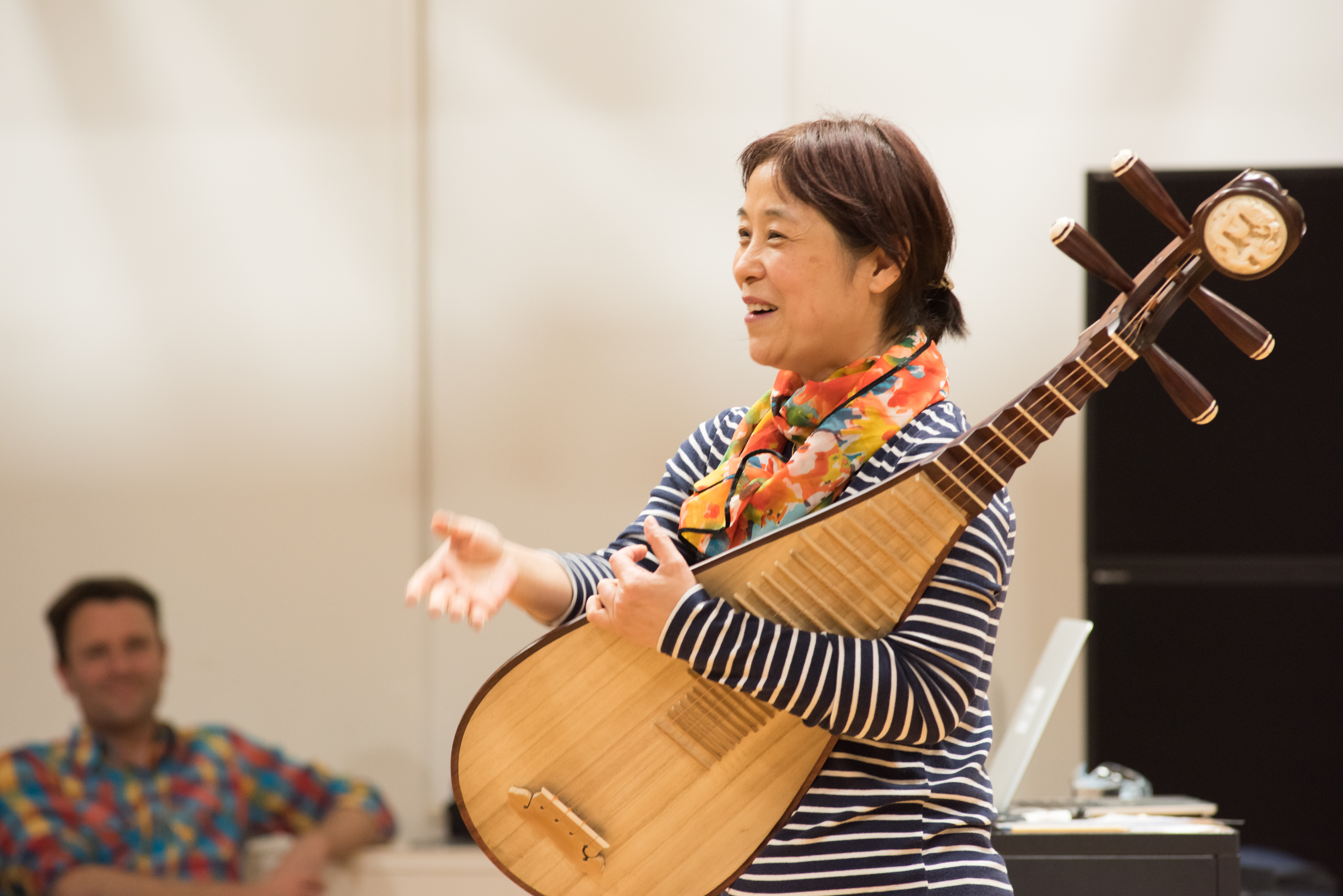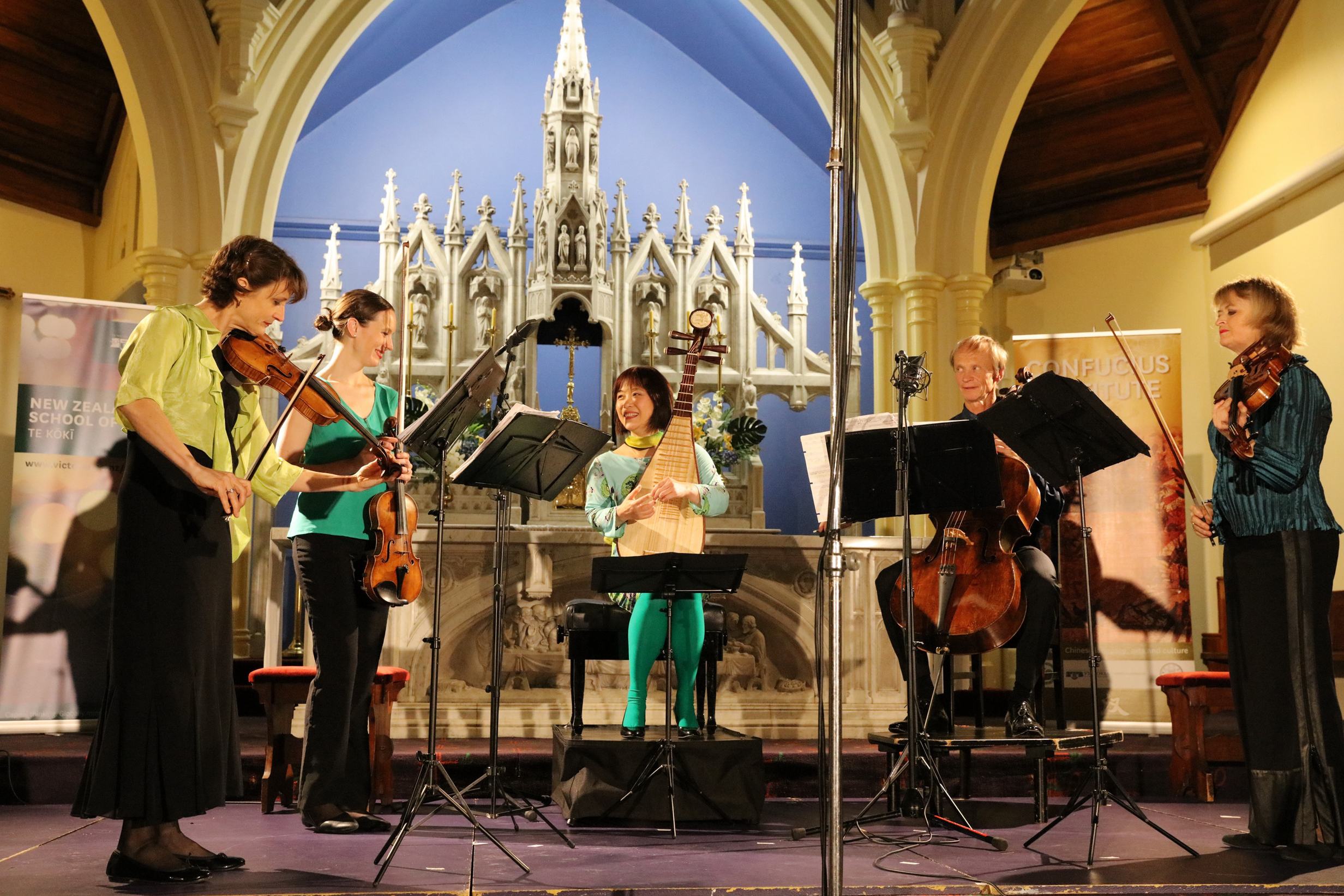Wu Man concert fills St Mary of the Angels
Visiting international Pipa virtuoso Wu Man and the New Zealand String Quartet performed to a capacity audience of over 400 at St Mary’s of the Angels church in Wellington in September.

At the beginning of the concert, the Confucius Institute’s Art Consultant Dr Luo Hui gave an informative and insightful introduction, including reciting The Pipa Tune, a beautiful poem by Bai Juyi, and recounting the history and development of pipa so that the audience could develop a deeper understanding of the 2,000 year old lute like instrument. Spoken introductions to pieces by the musicians continued throughout the concert, which made for much richer learning and listening experience, and added to the unique quality of the evening.
The programme opened with Wu Man playing two traditional Pipa solos, expertly showcasing the melodic and percussive effects of the instrument. Xi Yang Xiao Gu (Flute and Drum music at Sunset) is one of the representative works of ancient Chinese Pipa music, popular since the Ming Dynasty (1368-1644); and ‘White Snow in Spring’ first appeared in 1895 (during the Qing Dynasty).
Wu Man and the New Zealand String Quartet then gave a lyrical performance from the famous Chinese love story Butterfly Love. A movement from Chimaera for violin and pipa, was a lively and adventurous work by Wellington composer Tabea Squire. It was given a spirited introduction and performance by Monique Lapins together with Wu Man.
Red Lantern for Pipa and String Quartet was derived from the original score for the film Raise the Red Lantern by composer Zhao Jiping, here adapted by him and his composer-son, Zhao Lin. The epic nature of the music reflected its five sections: Prelude moonlight, Wandering, Love, Death, Epilogue.
By the interval the audience was completely captivated.
In the second half of the concert, Eight Colors and Concerto for String Quartet and Pipa were presented, popular works by Tan Dun, the famous Chinese composer known for his celebrated soundtrack to Crouching Tiger, Hidden Dragon.
The final Concerto for Pipa and String Orchestra presented a reworking of music from one of Tan Dun’s most popular works, Ghost Opera, and made demands of many sorts – percussive, lyrical, and vocal – of the performers. A great deal of rhythmic movement and expressive gesture almost gave the impression that the musicians were dancing…
In the restored and beautiful St. Mary of the Angels church, the capacity audience gave a final standing ovation signifying their appreciation for an evening of exquisite music, mixing old and new, East and West into an unforgettable experience.

The concert was presented by the Confucius Institute in partnership with the New Zealand School of Music, as part of Wu Man’s four-day visit to Wellington which also included workshops with students at the School of Music. Music has been an important focus for the Confucius Institute since it opened in 2010 and its partnership with NZSM has been instrumental in developing world-class exchanges and joint projects with Chinese musicians and music conservatories.
About the Musicians
Wu Man has caught the world’s attention with her virtual reinvention of an ancient Chinese instrument—the lute-like pipa. Her performances have relaunched the reputation of this 2000-year-old instrument in the West, with multiple Grammy Award nominations and Musical America naming her 2013 Instrumentalist of the Year.
Celebrating its thirtieth season in 2017, the New Zealand String Quartet, ensemble-in-residence at NZSM, has established an international reputation for its insightful interpretations, compelling communication and dynamic performing style. The Quartet is known for its imaginative programming and for its powerful connection with audiences of all kinds.
Concert report by the Confucius Institute at Victoria University of Wellington
A review of the concert by Jennifer Shennan can be found here

